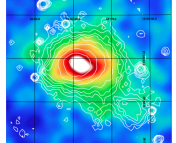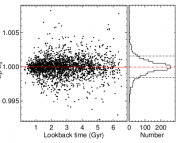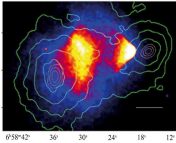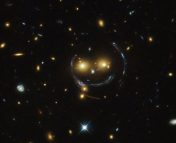Update: you can read Avi Loeb and Freeman Dyson’s discussion of this issue in our latest post.
Imagine a civilization in our galaxy a trillion years in the future. Astronomers in this society may not know of a universe beyond their own galaxy. At approximately the year 100 billion, all galaxies outside the Local Group of gravitationally bound galaxies will have sped out beyond the event horizon of the observable universe and the Local Group will have long since conglomerated into a single galaxy (“Milkomeda”). The Sun will have died out long ago, but the lowest mass stars in the present-day Milky way (0.1~1 solar masses) may still be living.
What’s more, the accelerating expansion of the universe predicted by the standard ΛCDM cosmology has redshifted the photons of the cosmic microwave background beyond the event horizon of the entire future universe, so future BOOMERANG or WMAP experiments will not work.
Clearly, these future observers could not use the same tools we have to understand the origins of the universe. Fortunately, Harvard Professor Avi Loeb has a very interesting short paper on the arXiv today that speculates on the tools astronomers living a trillion years in the future could use to infer the standard model of cosmology we have derived from present-day observations of the universe.
Loeb suggests that these future observers look for the precious few stars that have had a velocity sufficient to escape from Milkomeda (hypervelocity stars, HVSs). HVSs can be ejected from a galaxy by gravitational interactions with the supermassive black hole at the galaxy’s nucleus. After about two billion years of travel, Loeb estimates, the acceleration of a typical HVS will become dominated by the cosmological flow rather than the gravitational attraction of Milkomeda.
Because these HVSs will be the only extragalactic light source available to astronomers in the year one trillion, observations of this acceleration will be one of very few clues left of ΛCDM cosmology. The change in the Doppler shift that must be observed to measure this acceleration is beyond the capability of today’s state-of-the-are spectrographs, but Loeb concludes , “Future generations of experimentalists will have ∼ yr to improve upon this instrumental performance before it becomes crucial for validating the standard cosmological model.”
Professor Loeb does, however, allow for the possibility of cosmology textbooks (perhaps his own book?) being passed down from present generations, in which case all these observations would be unnecessary.





They’ll still have to do the observations, if only to convince themselves that the books being passed down are trustworthy.
Milkomeda? We’re naming it a trillion years before it’s born? That must be a record.
I can imagine, two trillion years from now, it complaining (galaxies will of course be self-aware by then, highly mobile, but generally unmotivated like all teenagers) about the wussy name its progenitors gave it.
As I was reading this I kept imagining some completely new civilization developing in that time and having to discover all of the secrets of the universe on their own without our help.
Amusing, to assume “we” will still be around. Though, still fascinating reading.